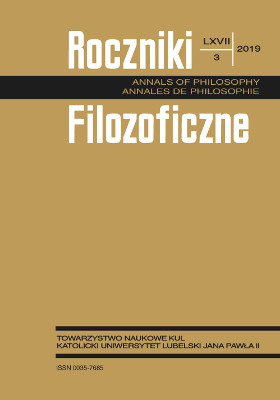Krytyki genealogiczne i autonomia przekonań moralnych
Abstrakt
Argument darwinowski w metaetyce może posiadać swój memetyczny odpowiednik oparty na założeniu, że nasze przekonania moralne powstały w procesie ewolucji kulturowej na drodze memetycznego doboru naturalnego. Czy istnieje jakaś różnica w mocy argumentacyjnej tych dwóch rodzajów krytyki genealogicznej? W niniejszym artykule staram się wykazać, że różnica taka może występować. Dlatego też nie jest prawdą, że każdy możliwy mechanizm przyczynowy mieszący się w ramach naturalistycznego obrazu świata w tym samym stopniu podważa nasze przekonania moralne. Należy jednak zadać dalej idące pytanie: czy powinniśmy pozostawić racjonalność naszych najgłębszych przekonań moralnych na łasce wyników badań empirycznych nad ich przyczynową genezą? W artykule staję na stanowisku, że nie powinniśmy tego czynić. Jeśli jednak takie podejście ma być uzasadnione, musimy obronić twierdzenie o autonomii systemu przekonań moralnych. Tylko wówczas odmienna koncepcja wiedzy, a także odmienne standardy obiektywnej racjonalności propozycjonalnej mogą zostać zastosowane do tychże przekonań; odmienne, tj. różne od tych właściwych dla przekonań i sądów nienormatywnych. Okazuje się, że tylko ekspresywiści mogą utrzymywać, że własność, na mocy której przekonania moralne pełnią charakterystyczną dla siebie funkcję praktyczną, nadaje dyskursowi moralnemu poszukiwaną autonomię.
Bibliografia
Chappell, Richard Yetter. 2017. „Knowing What Matters.” W: Does Anything Really Matter? Essays on Parfit on Objectivity. Red. Peter Singer, 149–167. Oxford: Oxford University Press.
Dawkins, Richard. 2012. Samolubny gen. Przełożył Marek Skoneczny. Warszawa: Prószyński i S-ka.
Dworkin, Ronald. 1996. „Objectivity and Truth: You’d Better Believe It”. Philosophy and Public Affairs 25, no. 2: 87–139.
Gibbard, Allan. 2003. Thinking How to Live. Cambridge, Mass.: Harvard University Press.
Joyce, Richard. 2006. The Evolution of Morality. Cambridge, Mass.: A Bradford Book — The MIT Press.
Kuźniar, Adrian. 2018. “Argument darwinowski w metaetyce”. Filozofia Nauki 26 (2018), nr 3: 21–48.
De Lazari-Radek, Katarzyna, i Peter Singer. 2014. The Point of View of the Universe: Sidgwick and Contemporary Ethics. Oxford: Oxford University Press.
Nozick, Robert. 1981. Philosophical Explanations. Cambridge, Mass: The Belknap Press of Harvard University Press.
Parfit, Derek. 2011. On What Matters. Volume Two. Oxford: Oxford University Press.
Parfit, Derek. 2017. On What Matters. Volume Three. Oxford: Oxford University Press.
Quine, Willard Van Orman. 2000. „O tym, co istnieje”. W: Z punktu widzenia logiki. Dziewięć esejów logiczno-filozoficznych. Przełożyła Barbara Stanosz, 29–47. Warszawa: Aletheia.
Quine, Willard Van Orman. 1984. „Review of Parsons’ Mathematics in Philosophy”. Journal of Philosophy 81, no. 12: 783-94.
Shafer-Landau, Russ. 2012. „Evolutionary Debunking, Moral Realism and Moral Knowledge”. Journal of Ethics & Social Philosophy 7, no. 1: 1–37.
Street, Sharon. 2006. „A Darwinian Dilemma for Realist Theories of Value”. Philosophical Studies 127: 109-66.
Copyright (c) 2019 Roczniki Filozoficzne

Utwór dostępny jest na licencji Creative Commons Uznanie autorstwa – Użycie niekomercyjne – Bez utworów zależnych 4.0 Międzynarodowe.





